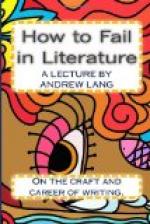“Is Miss Mary in?”
“Yes, ma’am, but she is very busy.”
“Oh, she won’t mind me, I don’t mean to stay long.”
Then in rushes the aunt.
“Over your books again: my dear! You really should not overwork yourself. Writing something”; here the aunt clutches the manuscript, and looks at it vaguely.
“Well, I dare say it’s very clever, but I don’t care for this kind of thing myself. Where’s your mother? Is Jane better? Now, do tell me, do you get much for writing all that? Do you send it to the printers, or where? How interesting, and that reminds me, you that are a novelist, have you heard how shamefully Miss Baxter was treated by Captain Smith? No, well you might make something out of it.”
Here follows the anecdote, at prodigious length, and perfectly incoherent.
“Now, write that, and I shall always say I was partly the author. You really should give me a commission, you know. Well, good bye, tell your mother I called. Why, there she is, I declare. Oh, Susan, just come and hear the delightful plot for a novel that I have been giving Mary.”
And then she begins again, only further back, this time.
It is thus that the aunts of England may and do assist their nieces to fail in literature. Many and many a morning do they waste, many a promising fancy have they blighted, many a temper have they spoiled.
Sisters are rather more sympathetic: the favourite plan of the brother is to say, “Now, Mary, read us your new chapter.”
Mary reads it, and the critic exclaims, “Well, of all the awful Rot! Now, why can’t you do something like Bootles’s Baby?”
Fathers never take any interest in the business at all: they do not count. The sympathy of a mother may be reckoned on, but not her judgement, for she is either wildly favourable, or, mistrusting her own tendencies, is more diffident than need be. The most that relations can do for the end before us is to worry, interrupt, deride, and tease the literary member of the family. They seldom fail in these duties, and not even success, as a rule, can persuade them that there is anything in it but “luck.”
Perhaps reviewing is not exactly a form of literature. But it has this merit that people who review badly, not only fail themselves, but help others to fail, by giving a bad idea of their works. You will, of course, never read the books you review, and you will be exhaustively ignorant of the subjects which they treat. But you can always find fault with the title of the story which comes into your hands, a stupid reviewer never fails to do this. You can also copy out as much of the preface as will fill your eighth of a column, and add, that the performance is not equal to the promise. You must never feel nor shew the faintest interest in the work reviewed, that would be fatal. Never praise heartily, that is the sign of an intelligence not mediocre.




